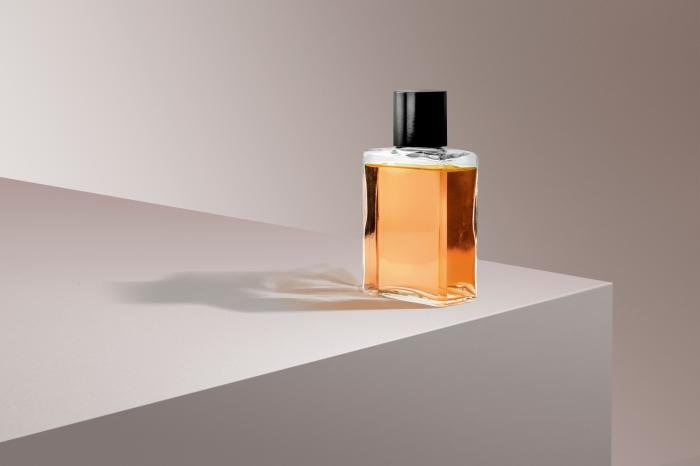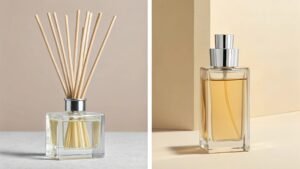Traditional alcohol-based fragrances evaporate quickly, leaving customers disappointed with poor longevity and potential skin irritation from harsh solvents.
Perfume oils represent concentrated fragrance formulations using carrier oils instead of alcohol, offering superior longevity, enhanced skin compatibility, and stable shipping characteristics that position them as a transformative force in modern fragrance development.

The fragrance industry’s shift toward oil-based formulations reflects growing consumer demand for sustainable, skin-friendly alternatives to conventional perfumes.
What Makes Perfume Oils Different from Traditional Fragrances?
Traditional perfumes fade fast while oil-based alternatives offer superior longevity for sensitive formulations.
Perfume oils contain concentrated fragrance in carrier bases instead of alcohol, providing enhanced skin compatibility and extended wear time through optimized molecular composition.

Composition and Carrier Oil Selection
The fundamental distinction lies in the base formulation. Traditional fragrances utilize 80-90% alcohol as a solvent, creating volatile compounds that evaporate quickly. Alcohol-free perfume alternatives employ carrier oils like jojoba or fractionated coconut oil. Jojoba mimics sebum’s molecular structure, ensuring deep skin penetration. Fractionated coconut oil offers neutral scent profiles and exceptional stability during shipping. These carrier oils preserve fragrance integrity while delivering sustained release through slower evaporation rates.
Concentration and Fixative Compatibility
Oil perfume formulations achieve higher concentration ratios without alcohol dilution. Standard perfumes contain 2-20% aromatic compounds, while oil-based versions reach 20-40% concentration. Fragrance oils require specific fixatives for optimal performance. Natural fixatives like benzoin or synthetic molecules enhance fragrance longevity through molecular binding. Blend ratios typically follow 70% base notes, 20% middle notes, and 10% top notes for balanced projection.
| Aspeto | Traditional Perfume | Perfume Oil |
|---|---|---|
| Base Component | 80-90% Alcohol | Carrier Oils |
| Concentração | 2-20% Fragrance | 20-40% Fragrance |
| Longevidade | 2-6 hours | 6-12 horas |
| Shipping Stability | Requires careful handling | Enhanced stability |
| Skin Compatibility | May cause irritation | Gentler formulation |
How Do Perfume Oil Manufacturers Source Their Ingredients?
Finding quality fragrance ingredients challenges product developers daily. Poor sourcing leads to unstable formulations and disappointed customers.
Perfume oil manufacturers source ingredients through direct partnerships with botanical farms, specialized chemical suppliers, and certified distilleries, emphasizing sustainable practices and quality control at every stage.

Direct Farm Partnerships and Regional Specialization
Leading perfume oil manufacturers establish direct relationships with farms in specific regions known for particular botanicals. Bulgarian rose farms, French lavender fields, and Indian sandalwood plantations provide concentrated essential oils with distinct terroir characteristics. These partnerships ensure consistent quality ingredients while supporting local communities through fair trade practices.
Manufacturers maintain strict quality standards through on-site inspections, batch testing, and seasonal planning. This approach guarantees authentic fragrance compounds that maintain their integrity during shipping and storage processes.
Carrier Oil Selection and Stability Considerations
The choice of carrier base significantly impacts fragrance performance and shipping stability. Manufacturers evaluate multiple factors when selecting between jojoba, fractionated coconut, and other carrier options:
| Carrier Oil Type | Stability Rating | Lança-perfume | Skin Compatibility | Shelf Life |
|---|---|---|---|---|
| Jojoba Oil | Excelente | Médio | Superior | 2-3 anos |
| Fractionated Coconut | Muito bom | Elevado | Bom | 1-2 anos |
| Sweet Almond | Bom | Médio | Bom | 12-18 meses |
| Grapeseed Oil | Fair | Baixa | Muito bom | 6-12 meses |
Sustainable sourcing practices now drive manufacturer decisions, with emphasis on organic certification, minimal processing, and reduced carbon footprint transportation methods. Quality ingredients sourced through these channels deliver superior blend ratios and enhanced fixative compatibility for professional product development teams.
Why Are Fixatives Crucial in Oil-based Perfume Formulations?
Oil-based perfumes without proper fixatives fade within hours, leaving product developers frustrated with poor customer retention and negative reviews.
Fragrance fixatives act as molecular anchors in oil-based formulations, slowing the evaporation rate of volatile compounds to extend scent longevity from 2-4 hours to 8-12 hours on skin.

Chemical Binding Mechanisms in Oil Carriers
Natural fixatives like benzoin resin and ambergris work differently in oil versus alcohol bases. In jojoba or fractionated coconut oil carriers, these compounds form stable molecular complexes that release fragrance molecules gradually. The lipophilic nature of oil-based formulations allows fixatives to bind more effectively with aromatic compounds, creating a sustained-release mechanism that alcohol-based perfumes cannot achieve.
Product development teams report that oil-based formulations with proper fixative ratios maintain 70% of their initial scent intensity after 6 hours, compared to 30% in alcohol-based alternatives.
Stability Considerations for Supply Chain
Oil carrier choice directly impacts fixative performance during shipping and storage. Fractionated coconut oil remains stable at temperatures up to 76°F, while jojoba oil maintains molecular integrity across wider temperature ranges. This stability prevents fixative degradation during transportation, ensuring consistent scent throw upon delivery.
| Carrier Oil Type | Temperature Stability | Fixative Compatibility | Shelf Life Impact |
|---|---|---|---|
| Jojoba Oil | -10°F to 85°F | High (all natural fixatives) | Extends 18-24 months |
| Fractionated Coconut | 32°F to 76°F | Medium (selective fixatives) | Standard 12-18 months |
| Sweet Almond | 35°F to 70°F | Low (limited fixatives) | Reduced 6-12 months |
Successful perfume oil manufacturers focus on fixative-to-fragrance ratios between 10-15% for optimal scent longevity without overwhelming the primary fragrance notes. This balance ensures customer satisfaction while maintaining cost-effective production scalability.
Can Oil-based Perfumes Match Traditional Fragrance Complexity?
Product developers often question whether oil perfume can achieve the sophisticated fragrance complexity of traditional alcohol-based formulations.
Oil-based perfumes absolutely match traditional fragrance complexity through precise blending techniques, quality oil carriers, and advanced fixative compatibility methods that create rich, multi-layered scent profiles.

Layered Fragrance Architecture in Oil-Based Formulations
Oil perfume manufacturers have revolutionized fragrance complexity by leveraging the unique properties of oil carriers. Unlike alcohol-based perfumes that rely on evaporation rates to reveal notes, oil formulations create depth through molecular weight distribution and oil solubility. The key lies in understanding how different fragrance notes interact with carrier oils like jojoba and fractionated coconut oil.
Advanced perfume oil manufacturers utilize sophisticated blending ratios that account for the slower release mechanism of oil-based systems. This allows for more intricate layering of top, middle, and base notes. The oil medium actually enhances certain fragrance families, particularly woods, musks, and resins, which develop richer complexity when dissolved in oil rather than alcohol.
Carrier Oil Selection and Fragrance Stability
The choice of carrier oil fundamentally impacts fragrance complexity and stability during shipping. Jojoba oil, technically a liquid wax ester, provides exceptional stability and doesn’t interfere with delicate fragrance molecules. Fractionated coconut oil offers excellent solubility for diverse fragrance components while maintaining shelf stability.
| Carrier Oil Type | Stability Rating | Fragrance Compatibility | Shipping Advantages |
|---|---|---|---|
| Jojoba Oil | Excellent (12+ months) | High for all note families | Temperature resistant |
| Fractionated Coconut Oil | Very Good (8-12 months) | Optimal for citrus/florals | Lightweight, cost-effective |
| Sweet Almond Oil | Good (6-8 months) | Best for oriental/woody | Natural preservation properties |
Supply chain considerations favor oil-based formulations for their reduced volatility and consistent scent profiles across temperature variations. This stability advantage allows product development teams to source ingredients globally while maintaining fragrance integrity throughout distribution networks.
How to Formulate Roll-on Perfume Oils for Maximum Impact?
Poor roll-on scent performance frustrates customers and damages brand reputation. Weak projection and brief longevity signal formulation failures that cost market share.
Effective roll-on perfume oils require precise carrier oil selection, optimal blend ratios of 15-20% fragrance concentration, and compatible fixatives that enhance longevity without compromising scent clarity.

Strategic Carrier Oil Selection
The foundation of any successful oil-based formulation begins with carrier oil choice. Jojoba oil stands as the gold standard due to its unique molecular structure that mimics human sebum, providing exceptional skin absorption and fragrance stability. Its shelf life extends beyond two years without rancidity, making it ideal for products requiring long shipping times.
Fractionated coconut oil offers a lighter alternative with superior spreadability and neutral scent profile. This carrier penetrates skin rapidly while maintaining fragrance integrity during temperature fluctuations common in supply chain logistics. Both options resist oxidation better than traditional sweet almond or grapeseed oils.
Optimizing Blend Ratios and Fixative Integration
Professional formulations typically employ a 15-20% fragrance oil concentration in carrier oils, significantly higher than alcohol-based perfumes. This concentration ensures adequate scent throw while maintaining cost-effectiveness for bulk production.
Fixative compatibility becomes crucial when stabilizing volatile top notes. Natural fixatives like benzoin resin or synthetic molecules such as Iso E Super integrate seamlessly with oil bases, extending wear time without creating cloudy formulations that indicate poor ingredient compatibility.
| Componente | Recommended Ratio | Função | Stability Impact |
|---|---|---|---|
| Óleo veicular | 75-80% | Base medium | High stability |
| Óleo de fragrância | 15-20% | Active scent | Medium volatility |
| Fixatives | 3-5% | Longevity enhancer | Excellent stability |
| Antioxidants | 0.1-0.5% | Preservation | Extended shelf life |
Quality perfume oil manufacturers understand that shipping stability requires formulations resistant to temperature variations and UV exposure, ensuring consistent performance from production facility to end consumer.
Conclusão
Perfume oil manufacturers are revolutionizing the fragrance industry through alcohol-free perfume alternatives that deliver superior longevity, enhanced skin compatibility, and stable shipping characteristics. Oil-based fragrances represent the future of product development, utilizing carrier oils and advanced fixatives to create complex, long-lasting formulations that outperform traditional alcohol-based perfumes. As fragrance industry trends shift toward sustainable, skin-friendly solutions, fragrance oils position themselves as the preferred choice for discerning consumers and forward-thinking manufacturers pursuing innovation in scent delivery and customer satisfaction.
FAQ
Q1: What are the benefits of using oil-based perfumes over alcohol-based ones?
Oil-based perfumes, such as those made with fragrance oils, offer longer-lasting scent retention and are gentler on the skin since they avoid alcohol, which can cause dryness. They are ideal for sensitive skin and provide a more subtle, layered fragrance experience.
Q2: How do I choose the right carrier oil for my perfume formulation?
The choice of carrier oil, like jojoba or fractionated coconut oil, depends on factors such as skin compatibility, scent longevity, and stability during shipping. Jojoba oil mimics the skin’s natural oils, while fractionated coconut oil is lightweight and has a long shelf life.
Q3: What are fragrance oils, and how are they used in perfume manufacturing?
Fragrance oils are synthetic or natural oil-based scents used in perfumes. They are blended with carrier oils to create alcohol-free fragrances, offering versatility in scent profiles and stability in formulations.
Q4: How can I ensure the stability of oil-based perfumes during shipping?
To maintain stability, use high-quality carrier oils like fractionated coconut oil, which resists oxidation. Proper packaging, such as dark glass bottles and temperature-controlled shipping, also helps preserve the fragrance.
Q5: Where can I find reliable suppliers for perfume oil ingredients?
Reputable suppliers can be found on essential oil trade platforms or through industry directories. Look for vendors who provide SDS (Safety Data Sheets) and detailed product specifications to ensure quality and compliance.




